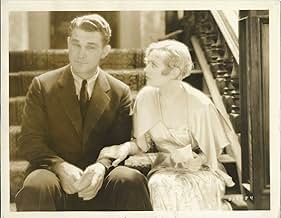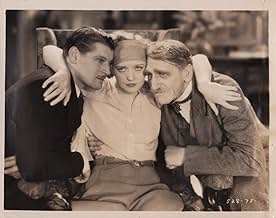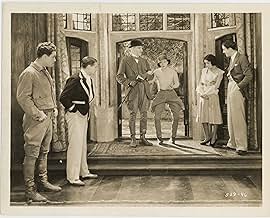AVALIAÇÃO DA IMDb
6,4/10
1,3 mil
SUA AVALIAÇÃO
Adicionar um enredo no seu idiomaOld man invites three of his illegitimate children to live with him.Old man invites three of his illegitimate children to live with him.Old man invites three of his illegitimate children to live with him.
- Direção
- Roteiristas
- Artistas
- Prêmios
- 2 vitórias no total
Guinn 'Big Boy' Williams
- Richard 'Dick' Berney
- (as Guinn Williams)
Nina Quartero
- Maria Credaro
- (as Nena Quartero)
Harry Allen
- Harry, the First Airplane Mechanic
- (não creditado)
Rina De Liguoro
- Hortense
- (não creditado)
Bobbie Hale
- Second Airplane Mechanic
- (não creditado)
- Direção
- Roteiristas
- Elenco e equipe completos
- Produção, bilheteria e muito mais no IMDbPro
Avaliações em destaque
Baron Winterton (C. Aubrey Smith) decides to locate this three estranged children and invite them to live on his estate. He sends an aide to the United States to contact Tony Flagg (Marion Davies), daughter of a dancer now deceased, who is thrilled to come. When the three siblings arrive, they strike up a friendship. Now living in the lap of luxury, it is a "fish out of water" situation for the three---especially Tony, who is something of a wild child. Still, the Baron learns to loosen up and allow himself the enjoyment of their company. However, a complication arises that may jeopardize their newly-created family.
This is definitely a pre-Code film, considering that the three children were born out of wedlock. The Hays office mandated some changes in the script, but still there is ambiguity about the relationships that produced the Baron's progeny.
The story is play-based, and it shows. Also, the humor is not very subtle. Still, it is a cute film, and it is easy to like the characters.
Watch for Ray Milland, who is nearly unrecognizable as one of the three siblings.
This is definitely a pre-Code film, considering that the three children were born out of wedlock. The Hays office mandated some changes in the script, but still there is ambiguity about the relationships that produced the Baron's progeny.
The story is play-based, and it shows. Also, the humor is not very subtle. Still, it is a cute film, and it is easy to like the characters.
Watch for Ray Milland, who is nearly unrecognizable as one of the three siblings.
This is one of the better Marion Davies talkies - and one of the few to allow her to exhibit her skill as a physical comedian which was so endearing in her silent films. OK, so she does a clunky tap number, but even Ruby Keeler's dancing from the era does not hold up for younger generations. The problem here is the script. The story falls into unbelievable melodrama in the last reel. It's quite stagey, and is obviously adapted from a play... but not well enough. Still, there is some snappy dialogue and slapstick throughout. Worth a look.
A grumpy old baronet, happily unmarried, decides to send for his three grown-up illegitimate children and provide them a home at his manor. To his surprise, he finds himself bonding with his uninhibited American daughter. Can he find satisfaction in his new role as THE BACHELOR FATHER?
This 1931 film, in which he gives a robust performance, marked the arrival at MGM of elderly Sir C. Aubrey Smith, very soon to be one of Hollywood's most valuable character actors. With his great hooked nose & beetling brows, Sir Aubrey looked every inch the part of the duke or general or statesman he would play so often. The acknowledged leader of the British community in Hollywood, Sir Aubrey would also champion the game of criquet in Southern California. He would remain very much in demand in studios all over town, right up to his death in 1948.
The film's top-billed star is Marion Davies. Best remembered today as the mistress of media mogul William Randolph Hearst & the chatelaine of Hearst Castle, the most fabulous residence on the West Coast, she was actually a very talented & pretty comedienne. For a few years, Hearst attempted to make her the queen of MGM (with her own production company & a huge bungalow-dressing room) but the studio already had several other queens - Dressler, Garbo, Shearer, Crawford - and he eventually moved her to Warner Bros. Here Miss Davies gets a chance to joke & clown and her scenes with Sir Aubrey are entertaining.
Her love interest is played by Ralph Forbes, a handsome young British actor who was just starting to find good films (THE TRAIL OF 98) as the silent days ended. He had all the qualities for major stardom, but sadly it was not to be. Celebrity would come to Ray Milland, here making one of his first screen appearances. Halliwell Hobbes & Doris Lloyd also appear to advantage.
This 1931 film, in which he gives a robust performance, marked the arrival at MGM of elderly Sir C. Aubrey Smith, very soon to be one of Hollywood's most valuable character actors. With his great hooked nose & beetling brows, Sir Aubrey looked every inch the part of the duke or general or statesman he would play so often. The acknowledged leader of the British community in Hollywood, Sir Aubrey would also champion the game of criquet in Southern California. He would remain very much in demand in studios all over town, right up to his death in 1948.
The film's top-billed star is Marion Davies. Best remembered today as the mistress of media mogul William Randolph Hearst & the chatelaine of Hearst Castle, the most fabulous residence on the West Coast, she was actually a very talented & pretty comedienne. For a few years, Hearst attempted to make her the queen of MGM (with her own production company & a huge bungalow-dressing room) but the studio already had several other queens - Dressler, Garbo, Shearer, Crawford - and he eventually moved her to Warner Bros. Here Miss Davies gets a chance to joke & clown and her scenes with Sir Aubrey are entertaining.
Her love interest is played by Ralph Forbes, a handsome young British actor who was just starting to find good films (THE TRAIL OF 98) as the silent days ended. He had all the qualities for major stardom, but sadly it was not to be. Celebrity would come to Ray Milland, here making one of his first screen appearances. Halliwell Hobbes & Doris Lloyd also appear to advantage.
The premise to this film is pretty unique, and clearly pre-Code. An old British gentlemen boasts to his doctor that he's had affairs with women all over the world, resulting in adult children he's never met. While irascible, he's perfectly happy with his life and doesn't want to "fill this place with a lot of noisy ill-bred brats," but is persuaded to summon three of them to his manor.
One of the kids is a plucky American girl played by Marion Davies, who sasses her father and gradually softens him in spite of himself. C. Aubrey Smith is the dad and fun to watch, as his strong appearance and mannerisms are perfect for the role. The other two kids are played by Nina Quartero and a dapper 24-year-old Ray Milland; both are engaging, but their roles are small. After doing things like dance around the place with her siblings, Davies agrees to call their father Chief, because after all, "We're all out of the same firehose," which was funny and eyebrow-raising at the same time.
The film is a little creaky in places, with poor sound quality and clearly based on a stage play, so it's far from perfect and requires patience. It attempts comedy, romance, and drama, and I can't say it does a great job at any of them, though the moment with the airplane towards the end is pretty good, and on the strength of Davies' endearing performance, it's decent enough. My favorite lines from her: "You said you loved me, and so did John. But as soon as I do something wrong, I'm out. That isn't the way I love. When I love somebody, no matter what the other party does, I go on loving them just the same. That's the way I am."
One of the kids is a plucky American girl played by Marion Davies, who sasses her father and gradually softens him in spite of himself. C. Aubrey Smith is the dad and fun to watch, as his strong appearance and mannerisms are perfect for the role. The other two kids are played by Nina Quartero and a dapper 24-year-old Ray Milland; both are engaging, but their roles are small. After doing things like dance around the place with her siblings, Davies agrees to call their father Chief, because after all, "We're all out of the same firehose," which was funny and eyebrow-raising at the same time.
The film is a little creaky in places, with poor sound quality and clearly based on a stage play, so it's far from perfect and requires patience. It attempts comedy, romance, and drama, and I can't say it does a great job at any of them, though the moment with the airplane towards the end is pretty good, and on the strength of Davies' endearing performance, it's decent enough. My favorite lines from her: "You said you loved me, and so did John. But as soon as I do something wrong, I'm out. That isn't the way I love. When I love somebody, no matter what the other party does, I go on loving them just the same. That's the way I am."
Although a casual viewing might have one concurring on the children being born out of wedlock, there is at least one mention later in the movie about a divorce. If one divorce is in place, three can be fairly assumed, and thus, of course, three marriages. // My real complaint is not about this movie at all, but rather, about a much more well-known and acclaimed movie: Orson Wells' "Citizen Kane". Kane, assumed by all to be a fictionalized William Randolph Hearst, marries an untalented girl, and uses his money and power to promote her career, to the embarrassment of all concerned. The closest this wife character comes to a real-life person is Marian Davies. By the time someone is reading this, they are fully aware that Ms Davies is actually very talented, but because Orson Wells' film is so much more well known than the entire output of Ms. Davies, there is virtually a sub-culture with a completely wrong idea of Marian Davies and her talent.
Você sabia?
- CuriosidadesDuring the opening scenes, the female visitor Mrs. Webb is referred to as a "grass" widow, which means a woman whose husband is away often playing golf or other similar obsessional activities for a prolonged period.
- Erros de gravação(at around 35 mins) A young man who does not appear elsewhere in the film is seen prominently on the stairway, center frame, with his arms in the air; it appears he has has just finished clapping his hands. Then he quickly ducks into the doorway to the library set. The camera holds on the empty staircase for six seconds, then Tony Marion Davies descends the stairs.
- Citações
Sir Basil Algernon 'Chief' Winterton: I am the first man ever to become a father by majority vote.
- Versões alternativasThe French version eliminated the scene inserted to make clear all of Sir Basil's children was legitimate.
- ConexõesAlternate-language version of Le père célibataire (1931)
Principais escolhas
Faça login para avaliar e ver a lista de recomendações personalizadas
Detalhes
- Data de lançamento
- País de origem
- Idiomas
- Também conhecido como
- The Bachelor Father
- Locações de filme
- Empresas de produção
- Consulte mais créditos da empresa na IMDbPro
Bilheteria
- Orçamento
- US$ 502.000 (estimativa)
- Tempo de duração1 hora 30 minutos
- Cor
Contribua para esta página
Sugerir uma alteração ou adicionar conteúdo ausente

Principal brecha
By what name was Papai Solteirão (1931) officially released in India in English?
Responda






























